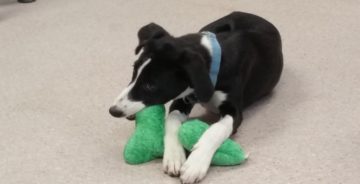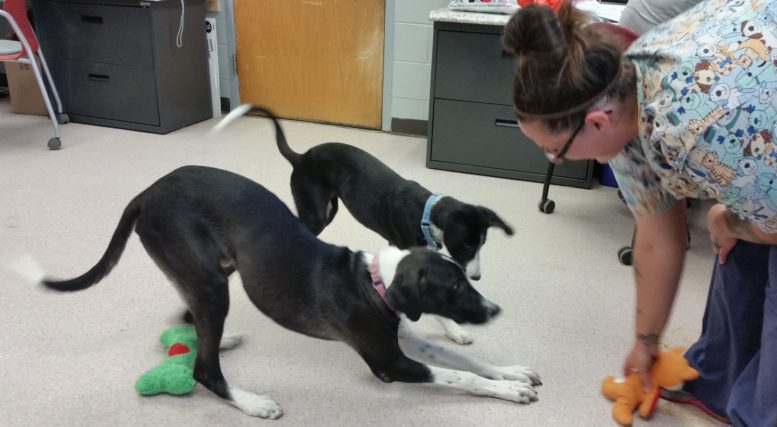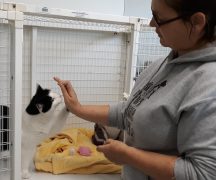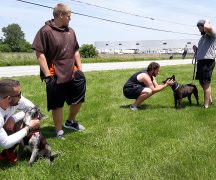By JAN LARSON McLAUGHLIN
BG Independent News
Bea and Toro traveled a long way to find homes here in Wood County – nearly 7,000 miles from Doha, Qatar.
It’s not unusual for the Wood County Humane Society to help find homes for dogs at area shelters, but this is the first time the organization has partnered with the Gulf Canine Connection.
“They were found out in the middle of the desert,” April McCurdy, behavior and training coordinator at the Wood County Humane Society, said of the dogs. “It’s a pretty incredible organization, so we figured, why not.”
Bea and Toro, both Saluki mixes around 6 months old, arrived in Bowling Green on Monday afternoon. They will be looked at by a local veterinarian, spayed and neutered, and later put up for adoption.
McCurdy explained that the Wood County Humane Society helps other shelters whenever possible – this just happens to be a more long distance delivery than normal.
“They reached out to us and asked for help. Since we were able to help, we figured we should,” McCurdy said.
This will be a test case working with the Gulf Canine Connection, to see if the Wood County Humane Society wants to accept more desert dogs.
“We’ll see how this goes,” McCurdy said.

Bea plays with a chew toy.
To reach Bowling Green, Bea and Toro endured a 15-hour flight from Qatar, a Middle Eastern nation neighboring Saudi Arabia.
Born in the middle of the arid terrain that comprises most of Qatar, Bea and Toro were discovered by rescue workers who help the many hundreds of homeless dogs of the region. Workers set up a makeshift shelter at a nearby construction site, where Bea, Toro, and other dogs are cleaned, fed, and watered for months while they await news if any group in the U.S. will accept them.
Because animal rescue in Qatar largely is decentralized, the fates of dogs like Bea and Toro depend on the ability of organizations like Gulf Canine Connection to identify suitable rescue partners and make arrangements for transfer.
According to the humane society, Gulf Canine Connection was founded in 2016 by Caroline Fernandez, who lived in Doha, Qatar, from 2014-2016. During her time in Qatar, Fernandez noticed widespread abuse and neglect of dogs, and said only expatriates and a handful of natives actively helped the dogs.
After two years of rescue work in Doha, Fernandez and her family relocated back to the U.S. But expatriates in Doha continued to contact her for help in placing dogs with her rescue partnership network.
Gulf Canine Connection has been able to place 50 dogs in the Unites States so far this year.
To prepare the dogs for flights, they are vaccinated for rabies, parvo, and distemper first, and then they are microchipped—all prerequisites to obtaining export papers. After the rabies vaccinations, dogs must be quarantined 30 days before their flight. During this time, a team of about 5-10 volunteers in Doha foster, vet the dogs, book the dogs on the flights, and obtain the export papers.
Once the dogs are booked on the flight with a volunteer flight buddy who escorts them, the export papers are obtained. On the day of the flight, foster parents bring their dogs and are met by one or two leaders of the group who hand over the export papers and vaccine books to the flight buddy. Upon arrival in the United States, the passenger picks the dogs up from baggage and clears U.S. Customs. At the U.S. airport, rescue partner representatives are waiting for the passenger and dogs.





